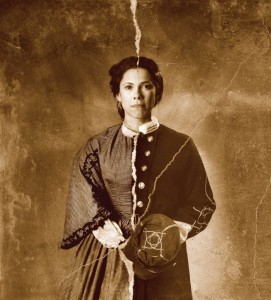In Rebel, director María Agui Carter illustrates that limiting Cuban-born immigrant Loreta Janeta Velázquez to one set of binary opposites would reduce her contribution to American identity and history
San Antonio Current
By Patricia Portales
SCREENS
LORETA VELAZQUEZ, THE SECRET
SOLDIER OF THE CIVIL WAR
By Patricia Portales
PUBLISHED: MAY 22, 2013
She was a woman who disguised herself as a man. She was an immigrant
who believed that “in thought and manner” she was an American. She was a
Confederate soldier who later became a Yankee spy. In Rebel, director
María Agui Carter illustrates that limiting Cuban-born immigrant Loreta
Janeta Velázquez to one set of binary opposites would reduce her
contribution to American identity and history. The documentary premieres
May 24 on PBS’ Voces, which showcases Latino works.
In dramatized scenes, Agui Carter shows that Velázquez — who was sent by
her wealthy father to live with an aunt in New Orleans in 1849 —
underwent the tutelage fitting a young Southern woman. When Velázquez
later married William, a Texan, just before the start of the Civil War, she
lost the support of her father who had hoped she would marry a Spanish
suitor of his choosing. William became a casualty of war, leaving Velázquez
with no family. The film portrays her decision to become an active
Confederate soldier as stemming from these unfortunate conditions and
from a childhood admiration for Joan of Arc and a desire to break women’s
societal constraints.
Interviews with Civil War historians Elizabeth Leonard, Richard Hall, and
Carman Cumming reveal the lax circumstances — lenient physical
inspection, self-appointed militia and volunteers, and soldiers so youthful
they still had beardless faces and high-pitched voices — that made her
military enlistment possible. Velázquez, under the alias Harry T. Buford,
became a member of the 7th Louisiana Regiment, participating in the Battle
of Bull Run, and the 11th Regiment in the Battle of Shiloh, when she was
wounded. During recovery, she was discovered and jailed briefly, until
General John H. Winder chose to utilize her as a spy for the Confederate
army. The atrocities of war caused her to rethink her position with the
Confederacy.
“To be a second Joan of Arc is a girlish fantasy, which my experiences as a
soldier dissipated forever,” she wrote in The Woman in Battle: A Narrative
of the Exploits, Adventures, and Travels of Madame Loreta Janeta
Velázquez, her 1876 autobiography. Influenced by the bravery of a slave
named Bob and the deficient skills of the Confederates with whom she had
served, Velázquez later became a special agent for the Union.
Agui Carter’s documentary focuses not only on the extraordinary
circumstances of Velázquez’s military service, but emphasizes her much
more dangerous act — publishing her memoir. The narrative’s importance
is theorized by interviews with U.S. Latino literature and history scholars
Jesse Alemán and Vicki L. Ruiz, who note that Velázquez’s critique of the
Confederacy influenced Civil War print culture and the ideology of the Lost
Cause, which cast the Confederates as brave and noble, overcome by sheer
force rather than the Union’s superior martial skill.
Agui Carter draws on a critique by Civil War Confederate General Jubal
Early, who discredited Velázquez’s narrative to the point of casting her
wartime participation as merely that of a prostitute. Velázquez is said to
have met with Early to defend her military experience, and still shots of
newspaper articles chronicle her arrest and verify that she was wounded in
combat.
“While we may not know everything, we can corroborate quite a bit of what
she writes in her book,” says DeAnne Blanton, Senior Military Archivist at
the National Archives and author of a book on women soldiers in the Civil
War. The recovery of archival material has given Velázquez attention in the
last decade, and Agui Carter’s documentary provides the visual culmination
that brings this historical figure back from the past.
Rebel: Loreta Velazquez, Secret Soldier of the American Civil War
10pm Fri, May 24
PBS/KLRN
http://sacurrent.com/screens/film/loreta-velazquez-the-secret-soldier-ofthe-
civil-war-1.1492420
Mary Lugo
CaraMar Publicity
770 623 8190
